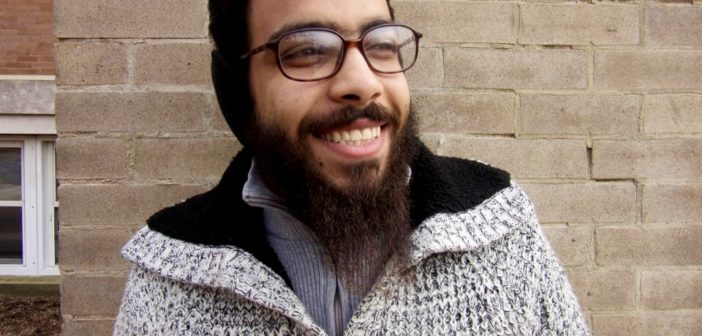Late in the day on Jan. 27, President Donald Trump issued an executive order instituting a travel ban on seven countries. Protests soon erupted at airports across the country with swift aid and assistance from lawyers and members of the American Civil Liberties Union.
Editors Bob Tomaszewski and Stella Fanega gathered reactions from across the campus community:
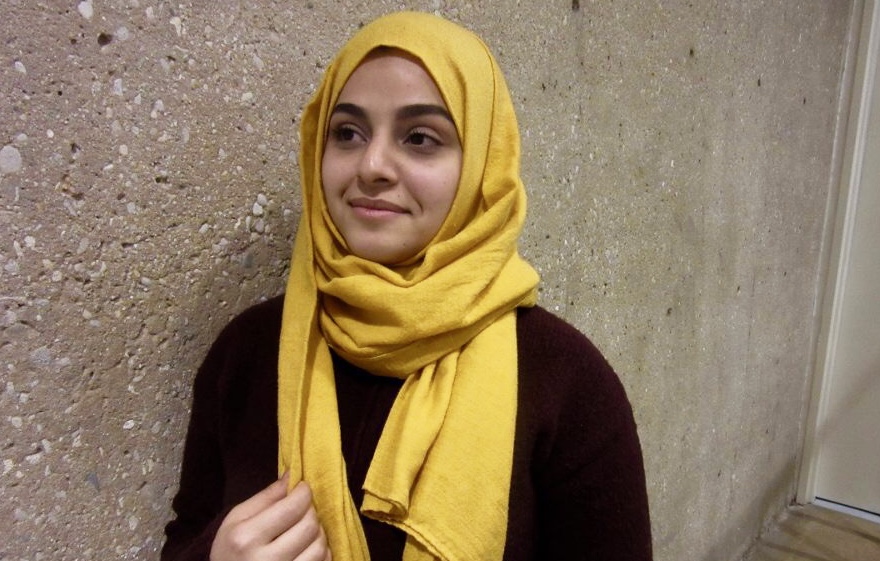
Photo by Emily Arias
Asma Al-Odaini: “First of all, I would like to clarify that the current Muslim ban is not only for refugees, but it also includes people like me, on visas, coming to the U.S., seeking a college degree. This current Muslim ban means that I, and many others like me, will be denied entry if I decide to visit my family back at home over the summer, and won’t be able to continue my degree here in the U.S. if I decide to get out for any reason, just because I happen to be a national of the countries that ban included. I think that this ban is offensive and counterproductive, and it would only further the issues. These kinds of policies reveal the unpreparedness of the current government to deal with the actual challenges, rather than further the division and ban students and people like me seeking a better future.”
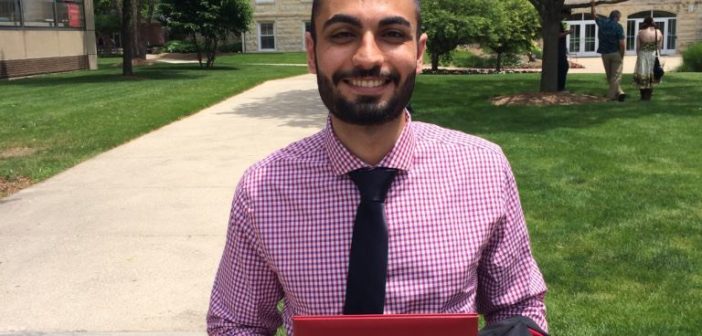
Photo courtesy of Sari AlGharabeh
Sari AlGharabeh (from Palestine, former graduate assistant in Multicultural Affairs): “In regards to your question, I don’t get affected by the ban because Palestine isn’t involved in the ban. However, I have friends who are from these countries and they are affected by it. Some people aren’t allowed to come back, so families are separated, jobs are lost and more. In order to have better control over borders, maybe there should be a stricter border control on all other people, not just minorities.”
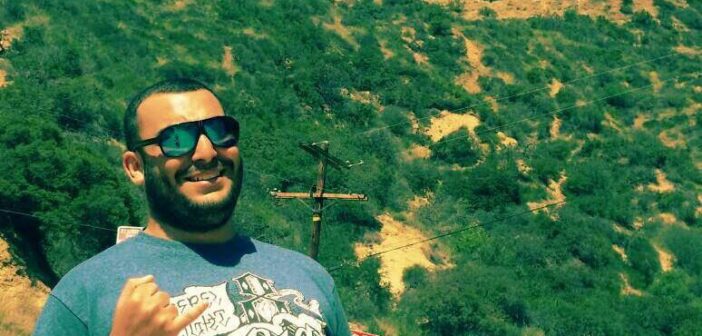
Photo courtesy of Youssef Balti
Youssef Balti (from Tunisia): “I found that really awful, selfish and stupid. Most of those countries are really poor and are going through civil war, their citizens don’t have any other choice than to flee. I don’t have the numbers but I believe that the U.S. didn’t receive as much refugees as European countries, Canada or Turkey which has 2.3 millions Syrian refugees. However, I understand the growing fear of terrorism and that among those refugees could be hidden terrorists, but I think that it is not an appropriate way to deal with this threat. It doesn’t affect me directly, but it hurts me deeply to see people’s life being put at risk. I also hope that this list of banned countries doesn’t extend to other Arabic/Muslim countries as it could jeopardize relationships between us. In fact, if it stays as it is, they can say that it is just for terrorism issues, however, if it extends to other peaceful Muslim countries, then it would be racial/xenophobic (Islamophobia) issue.”
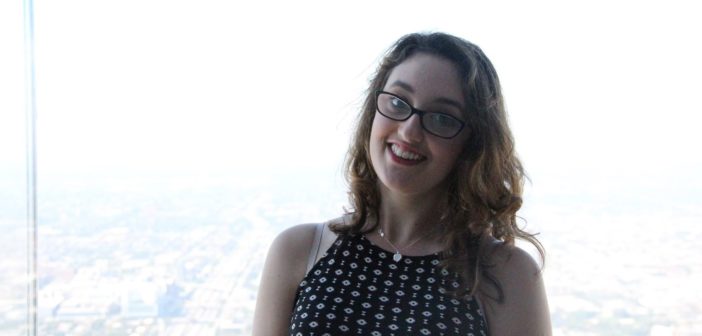
Photo courtesy of Sarah Mayhew
Sarah Mayhew (’17 from England): “I am completely shocked at the scale of the ban; it’s completely unnecessary. It’s only meant to last 90 days, but it’s severely affecting so many people’s lives. Targeting a Muslim majority is not going to give the rest of the world a very good opinion of the U.S. and its attitude towards the Muslim community. Spreading hatred and discrimination is never the answer. Though the ban does not affect me directly, it does affect friends of mine and I am horrified that a country that established itself on being a sanctuary for those escaping their countries for whatever reason are being kept out in 2017.”
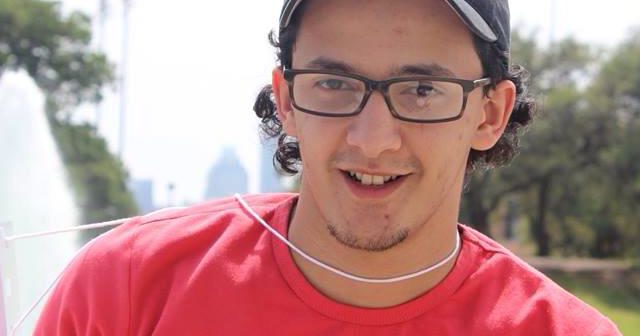
Photo courtesy of Mustafa Alnaqib
Mustafa Alnaqib: “(President) Trump actually wants to make big decisions and pass new laws in his early period of presidency to show his power and capabilities to the world, which is in fact waiting for what Trump is to do. However, unplanned decisions normally have adverse consequences. For instance, such decisions must go through certain stages, starting with a notification, then a warning. And they all have to be scheduled in order to let people plan well in advance.
“One of my friends spent months and a fortune of money to travel outside Yemen since the airports are closed to the current political context and the war. He planned to travel to Malaysia and from there to the U.S. Unfortunately, he couldn’t get the visa though everything was pre-planned perfectly, and his family lives there.
“Other people are stuck in the airports. Therefore, people should’ve been informed in advance that they wouldn’t be allowed into the country. We’re very affected. We don’t like to be treated as criminals, especially at the time so many of us are in need of asylum and support by a country like the USA. Personally, I was planning to go back to the U.S. But now it seems to be impossible.
“You can see the reaction of Iran toward Trump’s crazy decisions. They did the same thing and detained America citizens in their airports. And the reason why Trump is doing this is just illogical and so racist. A lot of Muslims are married to Christians and things go just perfectly. Not to mention that Trump overgeneralized. He, for example, banned Syrians from entering the country because it’s a Muslim country, but yesterday a Christian Syrian family, refugees, was detained in the airport! I believe that Trump doesn’t study his decisions very well before implementing them. He knows he rules the most powerful country in the world, so he doesn’t give a hoot about the consequences which may come as a disaster for all Americans and even us.”

Sarvin Haghighi and husband Andy Culley
Andy Culley and Sarvin Haghighi (Haghighi was the January featured artist at Schoenherr Art Gallery):
Culley: “Her (Haghighi’s) current return ticket via Air New Zealand departs Tuesday Australian time and lands at Houston IAH. We were told NOT to land at IAH. It appears that the EO is being “interpreted” differently airport by airport. Nothing against DHS, evidently the Trump administration did NOT run this EO by DHS who is the agency that has to implement it! Whatever…moving on.. Tentatively we are looking at departing Tuesday (Australia time), Monday night U.S. time and arriving into either Chicago ORD or Boston Logan.
This is a fluid situation…and will try and keep you all updated. Please rest assured that we have the “Dream Team” of U.S. civil rights’ attorneys working for her. Supreme Court level peeps … Even though this awful EO has really given us insight into the cruelty of what all governments are capable of … Our faith in humanity has never been better due to the wonderful messages of support from folks worldwide and of all faiths.”
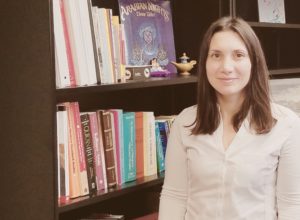
Photo courtesy of Esra Tasdelen
Dr. Esra Tasdelen (Middle Eastern and North African Department chair): “My personal reaction as a professor of higher education: It’s very troubling for me, because I myself came to the United States as an international student on a visa. And the United States saw me as a human being, not someone of a specific religion, or ethnicity, or national origin. I was accepted and I got financial aid even before I started working here, so that sense of equality, truly made America great for me actually. So I would not want to deny that same feeling of equality to other international students who want to come here, who want to contribute to academia.”
Fereshteh Toosi (Media Studies professor): “I’ve lived in the U.S. for my whole life. I came here with my parents from Iran when I was an infant. I got my citizenship when I was 30 years old. For my entire life, it has been challenging to live in the United States as a person from Iran. There have always been restrictions, ignorance, xenophobia and unfounded fear. That is nothing new. As an adult, I was fortunate to work and travel internationally on a green card, which gave me the legal right to live and work in the United States. If not for the difference of a few years, it could have been me stranded in one of those airports. The ban divides families. My friend’s grandfather is buried here. His grandmother lives in Iran. Due to the ban, she can’t come visit her late husband’s grave, and my friend can’t visit his grandmother. The ban prevents students from returning to their studies. It disrupts research and collaboration between artists and scholars who have positions as professors at American universities. It will prevent director Asghar Farhadi, who was nominated for an Academy Award, from attending the Oscars. It punishes the Iraqis and Afghans who assisted the U.S. military, and it proves dangerous by provoking the ire of other countries. For example, in response to the U.S. travel ban, Iran has decided to bar Americans from entering its borders. That means American citizens’ privileges to travel and explore the world are also being curtailed. The ban is in violation of The Immigration and Nationality Act of 1965. The president’s executive order and his public statements reveal his ignorance about immigration rules and procedures. The legal path to citizenship is complex, competitive, expensive, and time-consuming. If you have a green card or if you have refugee status, you have gone through a long and rigorous vetting process to legally live and work in the United States. This ban closes the borders not only to non-citizens but also to those with valid visas. Even legal immigration pathways are now criminalized. It’s a dangerous precedent.”
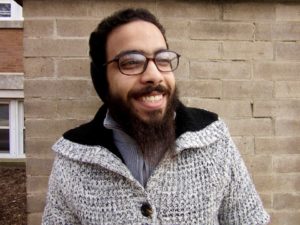
Photo by Emily Arias
Youssef Mekawy (Egypt): “I am just surprised of how could this executive order be accepted and welcomed among a nation that is supposed to be standing for freedom of expression and religious beliefs. It increases the hatred and Islamophobia, and corrupts the freedoms of the Americans; the freedoms on which this nation has been built on. This Muslim-ban executive order is a clear straightforward racism. I feel unfairly misjudged upon unjustified generalizations. I feel unwelcome and excluded. I am hoping that the reactions of the American people will show me otherwise.”
Statement by Dr. Jack Schindler, director of International Programs: “As I hope you all already know, we here in Abe House are all deeply concerned about the recent executive order to suspend our refugee program and ban certain visa approvals. As I hope you also understand, we highly value your presence here at North Central College and will support any of you who may be affected in the aftermath of this order. At the same time, we certainly hope that none of you will experience any difficulties in the future and that you and your families will remain safe from any unfair practices.
For now, I want you to know that you are always welcome to come to Abe House to talk with any of us, that we are always happy to see you, and that we take your concerns or worries very seriously.”

